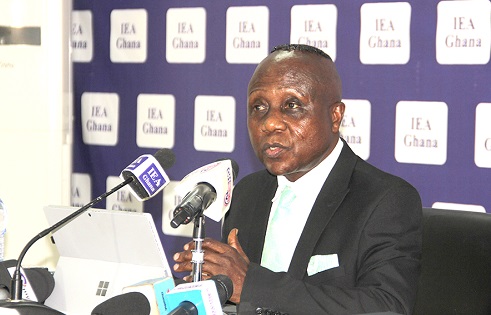
Government must share risk with depositors — IEA
The Director of Research at the Institute of Economic Affairs (IEA), Dr John K. Kwakye, has suggested that the government should meet investors of the collapsed financial institutions halfway, instead of paying the entire 100 per cent of their principal investments.
“They should be prepared to bear some of the financial risk from the investor decisions they made. Maybe the government should have met them part of the way and pay them 70 per cent, so that they also bear the 30 per cent,” he said.
Dr Kwakye, who was speaking at a press briefing organised by the IEA to share its views on President Nana Addo Dankwa Akufo-Addo’s State of the Nation Address (SONA) in Accra yesterday, said his suggestion, if implemented, would reduce the financial burden on the government.
He said whether the 100 per cent payment would come from the budget or the government had to borrow money to do that, the amount involved would add up to the nation’s public debt.
“I agree that the government should pay them; I am only arguing that the investors should pay part, while the government also bore part of the risk,” he said.
![]()
GH¢5 billion
President Nana Addo Dankwa Akufo-Addo noted in the SONA that his administration inherited a collapsing financial sector that had led to failing banks and considerable agony to many people, with the government having to conjure GH¢13 billion to pay the 4.6 million affected customers of the banks.
He announced that the government had made available an additional GH¢5 billion to cater for microfinance and savings and loans customers whose money had been locked up.
“I would like to repeat that all depositors of the savings and loans and microfinance institutions, including DKM, which collapsed in 2015, will receive 100 per cent of their deposits, too, once the validation exercise is concluded,” the President said.
Burden
Dr Kwakye suggested that the surviving banks could have been asked to contribute to the banking clean-up cost because of the interconnectedness within the banking industry, which implied that all banks must bear some responsibility for the crisis.
“The surviving banks have been posting abnormal profits which could, justifiably, be taxed. It is to safeguard customer deposits and reduce budgetary costs, in case of bank failures, that deposit insurance or protection schemes have been instituted in mature economies. The idea has been mooted in Ghana, but it is not clear whether the scheme is functional,” he said.
Daily Graphic checks indicate that the Deposit Protection Scheme became operational in October last year, following the establishment of the Ghana Deposit Protection Corporation.
Roads
On the roads sector, Dr Kwakye said the deficit in roads had become particularly acute, the reason for declaring 2020 “the year of roads”.
